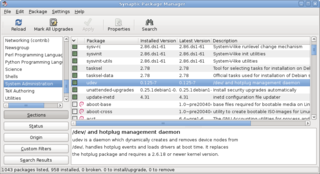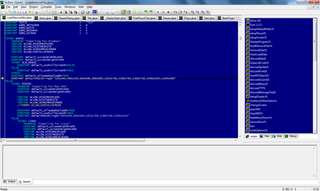
A package manager or package-management system is a collection of software tools that automates the process of installing, upgrading, configuring, and removing computer programs for a computer in a consistent manner.
Poplog is a reflective, incrementally compiled software development computer programming integrated development environment and system platform for the programming languages POP-11, Common Lisp, Prolog, and Standard ML. It was created originally in the United Kingdom for teaching and research in artificial intelligence, at the University of Sussex, and later marketed as a commercial package for software development, teaching, and research. It was one of the initiatives supported for a time by the UK government-funded Alvey Programme.
In computing, cross-platform software is computer software that is designed to work in several computing platforms. Some cross-platform software requires a separate build for each platform, but some can be directly run on any platform without special preparation, being written in an interpreted language or compiled to portable bytecode for which the interpreters or run-time packages are common or standard components of all supported platforms.
A cross compiler is a compiler capable of creating executable code for a platform other than the one on which the compiler is running. For example, a compiler that runs on a PC but generates code that runs on Android devices is a cross compiler.
Object Pascal is an extension to the programming language Pascal that provides object-oriented programming (OOP) features such as classes and methods.

DTrace is a comprehensive dynamic tracing framework originally created by Sun Microsystems for troubleshooting kernel and application problems on production systems in real time. Originally developed for Solaris, it has since been released under the free Common Development and Distribution License (CDDL) in OpenSolaris and its descendant illumos, and has been ported to several other Unix-like systems.

Lazarus is a cross-platform, integrated development environment (IDE) for rapid application development (RAD) using the Free Pascal compiler. Its goal is to provide an easy-to-use development environment for developing with the Object Pascal language, which is as close as possible to Delphi. It is free and open-source software with different parts released under different software licenses.

The history of Unix dates back to the mid-1960s, when the Massachusetts Institute of Technology, AT&T Bell Labs, and General Electric were jointly developing an experimental time-sharing operating system called Multics for the GE-645 mainframe. Multics introduced many innovations, but also had many problems. Bell Labs, frustrated by the size and complexity of Multics but not its aims, slowly pulled out of the project. Their last researchers to leave Multics – among them Ken Thompson, Dennis Ritchie, Doug McIlroy, and Joe Ossanna – decided to redo the work, but on a much smaller scale.

Watcom C/C++ is an integrated development environment (IDE) product from Watcom International Corporation for the C, C++, and Fortran programming languages. Watcom C/C++ was a commercial product until it was discontinued, then released under the Sybase Open Watcom Public License as Open Watcom C/C++. It features tools for developing and debugging code for DOS, OS/2, Windows, and Linux operating systems, which are based upon 16-bit x86, 32-bit IA-32, or 64-bit x86-64 compatible processors.

Linux is a generic name for a family of open-source Unix-like operating systems based on the Linux kernel, an operating system kernel first released on September 17, 1991, by Linus Torvalds. Linux is typically packaged as a Linux distribution (distro), which includes the kernel and supporting system software and libraries, many of which are provided by the GNU Project.

Software portability is a design objective for source code to be easily made to run on different platforms. An aid to portability is the generalized abstraction between the application logic and system interfaces. When software with the same functionality is produced for several computing platforms, portability is the key issue for development cost reduction.
Basic4GL is an interpreted, open source version of the BASIC programming language which features support for 3D computer graphics using OpenGL. While being interpreted, it is also able to compile programs on top of the virtual machine to produce standalone executable programs.

The history of free and open-source software begins at the advent of computer software in the early half of the 20th century. In the 1950s and 1960s, computer operating software and compilers were delivered as a part of hardware purchases without separate fees. At the time, source code—the human-readable form of software—was generally distributed with the software, providing the ability to fix bugs or add new functions. Universities were early adopters of computing technology. Many of the modifications developed by universities were openly shared, in keeping with the academic principles of sharing knowledge, and organizations sprung up to facilitate sharing.
Indic Computing means "computing in Indic", i.e., Indian Scripts and Languages. It involves developing software in Indic Scripts/languages, Input methods, Localization of computer applications, web development, Database Management, Spell checkers, Speech to Text and Text to Speech applications and OCR in Indian languages.

GLBasic is a commercial BASIC programming language that can compile to various platforms including Windows, Linux, Mac OS X, and some handheld devices. The language is designed to be simple and intuitive.

Unix is a family of multitasking, multi-user computer operating systems that derive from the original AT&T Unix, whose development started in 1969 at the Bell Labs research center by Ken Thompson, Dennis Ritchie, and others.
Microsoft, a technology company historically known for its opposition to the open source software paradigm, turned to embrace the approach in the 2010s. From the 1970s through 2000s under CEOs Bill Gates and Steve Ballmer, Microsoft viewed the community creation and sharing of communal code, later to be known as free and open source software, as a threat to its business, and both executives spoke negatively against it. In the 2010s, as the industry turned towards cloud, embedded, and mobile computing—technologies powered by open source advances—CEO Satya Nadella led Microsoft towards open source adoption although Microsoft's traditional Windows business continued to grow throughout this period generating revenues of 26.8 billion in the third quarter of 2018, while Microsoft's Azure cloud revenues nearly doubled.









